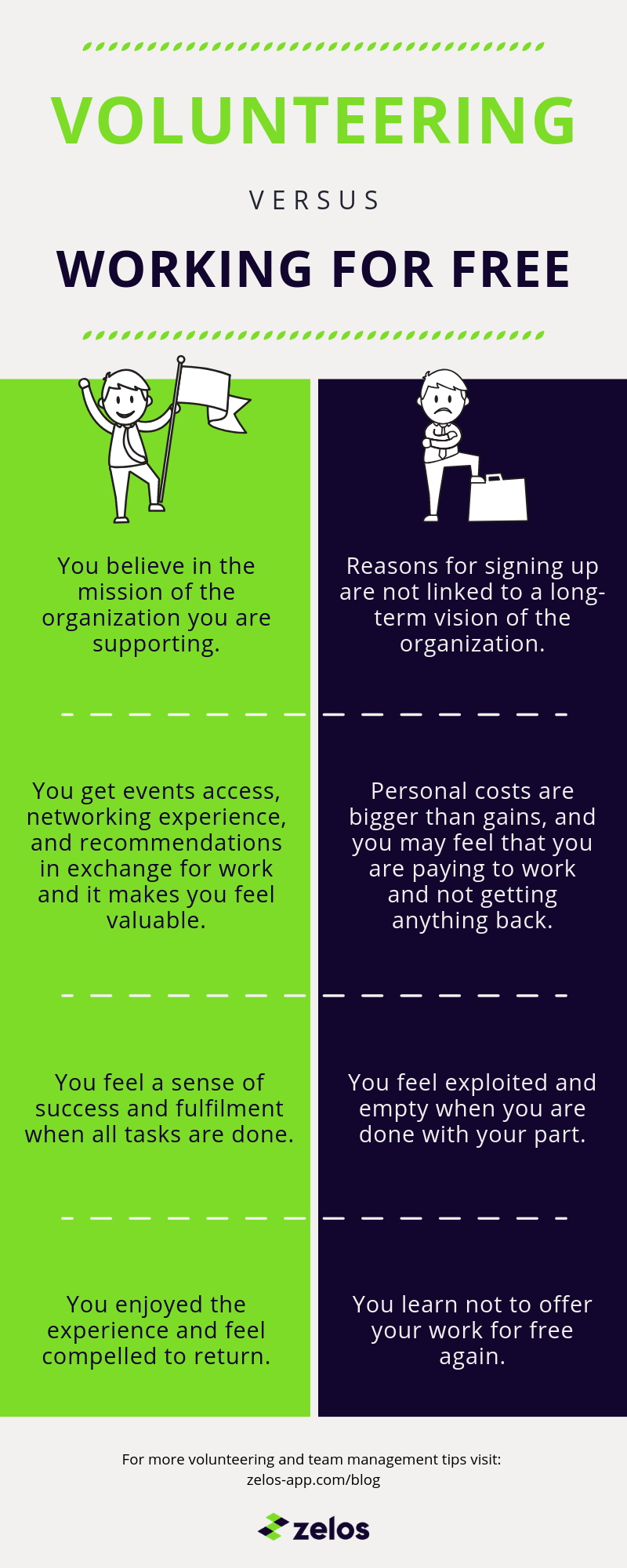Is volunteering the same as working for free? No. It it is not.
Volunteering is driven by a desire to make a positive impact on the community. Free workers may see a long-term benefit for the gained experience, but their primary purpose is not altruistic.

Are you recruiting volunteers or seeking free workers?
It is always an unfortunate surprises to see people posting ads for recruiting volunteers when they are actually seeking free workers. And sometimes industry members make fun of genuine calls for volunteers and point them out as free work request. Often they are not.
We live in the age where “exposure as payment” is a recurring meme. So it is super important for team coordinators to understand the difference between volunteering and working for free.
Not all volunteer-related work is unpaid.
Nonprofit organizations often hire volunteer coordinators who are compensated for their volunteer management services. Some organizations also have full-time volunteers who receive an allowance for their work, as it happens with Doctors without Borders.
But even unpaid volunteers are always rewarded in some way or another. Exclusive access and personal growth are some of the things volunteers get in exchange for their work. These things make people feel valued and compensated.
The main differences between a volunteer and an unpaid worker are rooted in the “why” (as Simon Sinek would say). These are the reasons that motivate someone to spend their extra time working for a nonprofit.
Volunteers believe in the goal
Most people volunteer their time because they believe in the mission of the organisation they are supporting. For example, people who like dogs might be interested in volunteering for their local animal shelter.
Free workers, on the other and, may not believe in the main goal. Their reasons for signing up do not have to be linked to a long-term vision. Sometimes people work for free because they need the experience to polish their skills, build a portfolio, or do some networking.
Volunteers feel that their contribution is a choice
Even though it may be hard work, volunteers actively choose to help. They have no obligation to be there, or deliver any results. They are usually flexible in terms of the hours and duration of their commitment. They may also choose to volunteer for specific events or projects or offer their services on a more regular basis.
Volunteers typically don’t have a formal employment contract and are not considered employees of the organization they are helping. They usually work on a non-binding, informal basis.
Working for free may have a more defined timeframe or be part of a structured program. For example internships or apprenticeships typically have a specific start and end date. To ensure that work actually gets done, the worker may need to sign some form of an agreement. This would outline the arrangement regarding the work hours, tasks they perform and the duration of their engagement.
Volunteers feel a sense of achievement
Volunteers feel a sense of success and fulfilment. This is often linked to their belief in the organization’s mission. Free workers, on the other hand, may feel exploited and empty when they are done doing their part.
Volunteers feel welcomed to return
Since they are working on something they love and they are valued for it, volunteers feel compelled to return. In other words, they enjoy working with a purpose. Free workers, unfortunately, often learn not to offer their work for free again.
Don’t look for free workers, recruit and grow your volunteer supporters!
